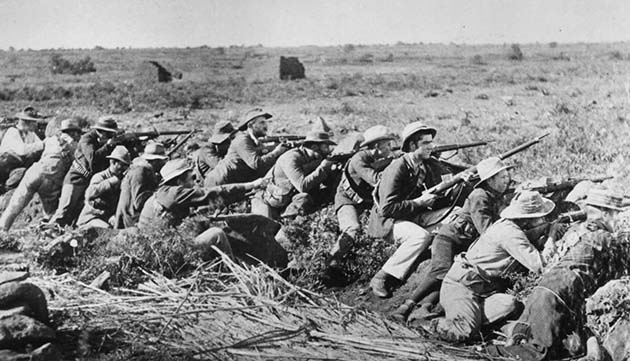Unnecessary Wars
By Henry Reynolds
NewSouth Publishing, $29.99
The hellholes on Manus Island and Nauru can trace their lineage from Australia’s participation in the world’s first concentration camps—more than 100 years ago on the South African veldt.
In the course of the Boer War (1899-1902), troops from the Australian colonies participated in the rounding up by British forces of tens of thousands of Dutch-speaking women, children and old people and their black servants.
The camps, Henry Reynolds tells us, “were hastily prepared tent cities, often on the open veldt, overcrowded, with limited fresh water and primitive sanitation”.
The death rate was catastrophic. “160,000 Boers were incarcerated, 28,000 died, more than 22,000 of them children.
“More than 100,000 Africans were placed in even more ramshackle camps, where at least 14,000 died, 80 per cent of them children.”
The Australian colonies (and from 1901 the new Federal Government) were enthusiastic supporters of Britain’s war against two small Dutch-speaking republics, which happened to sit on top of the world’s richest source of gold.
All six colonies sent troops in October and November 1899 amid scenes of popular jubilation as detachments sailed from the six capitals, Newcastle and Launceston.
Australian troops quickly established a reputation for carrying out atrocities. A politician from the (British) Cape Colony, critical of the war, reported that: “These swashbucklers arrested inhabitants, drove off stock and shot a few people without greatly caring who they were.”
Colonial soldiers, “notably Australians”, were disproportionately responsible for assaults on black soldiers and Indian and Chinese civilians.
As the war became more savage and the concentration camps were established, British forces burnt more than 30,000 Boer farms and 40 towns, killing or stealing millions of head of livestock, and destroying dams.
Australian soldiers were willing participants, dragging women and children from their homes and looting without compunction.
One Tasmanian soldier recorded: “All Dutch houses were looted, and the families brought along … It was a very amusing sight to see our troops returning to camp with all kinds of loot …
“Had great fun when ‘burring’ things up, breaking glass, cracking wood, hammering, etc … All went out skirmishing yesterday looking through houses etc, several of which were burnt down.”
All these actions were war crimes—in breach of the new (1900) Hague Convention on the conduct of war, which prohibited attacks on civilians and pillage.
The various Australian governments simply ignored their legal responsibilities. Labor, Reynolds records, “outdid their political opponents in their deference to the empire”.
Labor leader JC Watson told the new federal parliament in 1902 that, “never in the history of nations has a war been conducted with a greater regard for humanity than the Boer war”.
Racism
The racist attitudes that underpinned wartime brutality came to the surface with fresh force in 1904, two years after the fighting ended.
News broke that the British were bringing 60,000 Chinese labourers into the conquered Transvaal to work in the goldmines.
Australian politicians—who had built the White Australia policy into Federation in 1901—were appalled.
Involvement in the war had been justified by claims that British workers in the Boer states were suffering.
But as Alfred Deakin said, if Australia had been told, “it was a war for Chinese miners, what a different aspect it would have worn.”
Reynolds centres Unnecessary Wars on the Boer War, but he spends the bulk of the book discussing the contest between the two tendencies that dominated Australian political life in the second half of the 19th century—loyalty to Crown and Empire on the one hand and radical, republican nationalism on the other.
His sympathies are clearly with the nationalists, those who argued that Australia’s best defence against foreign aggression was its geographic isolation and that loyalty to the Empire brought the danger of being dragged into Britain’s distant wars.
But there was small but vocal opposition to the Boer War from socialists and others on the left. The labour paper The Clipper in Hobart and The Worker in Brisbane condemned the rush to militarism and war.
In Melbourne, the radical paper Tocsin told its readers: “This is not a war of Britain against Boer, but of Capitalists against Kruger’s anti-Capitalistic government.”
The sentiment rings true today as the ghosts of the Boer War cheer on the invasion and occupation of Iraq, Syria and Afghanistan.
By David Glanz






